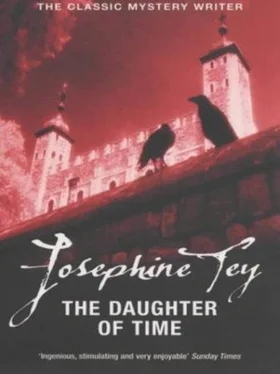‘Oh, yes,’ said the boy, pulling out his usual wad of notes and drawing up a chair by hooking his right toe in the crossbar. He sat down on the chair. ‘Where shall I begin?’
‘Well, about Elizabeth we know. He married her, and she was Queen of England until she died and he made a bid for the mad Juana of Spain.’
‘Yes. She was married to Henry in the spring of 1486 – in January, rather; five months after Bosworth – and she died in the spring of 1503.’
‘Seventeen years. Poor Elizabeth. With Henry it must have seemed like seventy. He was what is euphemistically referred to as “unuxorious”. Let us go on down the family. Edward’s children, I mean. Fate of the two boys unknown. What happened to Cecily?’
‘She was married to his old uncle Lord Welles, and sent away to live in Lincolnshire. Anne and Katherine, who were children, were married when they were old enough to good Lancastrians. Bridget, the youngest, became a nun at Dartford.’
‘Orthodox enough, so far. Who comes next? George’s boy.’
‘Yes. Young Warwick. Shut up for life in the Tower, and executed for allegedly planning to escape.’
‘So. And George’s daughter? Margaret.’
‘She became the Countess of Salisbury. Her execution by Henry VIII on a trumped-up charge is apparently the classic sample of judicial murder.’
‘Elizabeth’s son? The alternative heir?’
‘John de la Pole. He went to live with his aunt in Burgundy until—’
‘To live with Margaret, Richard’s sister.’
‘Yes. He died in the Simnel rising. But he had a younger brother that you didn’t put in that list. He was executed by Henry VIII. He had surrendered to Henry VII under a safe-conduct, so Henry, I suppose, thought that it might break his luck to ignore that. In any case he had about used up his quota. Henry VIII took no chances. He didn’t stop at de la Pole. There were four more that you missed out of that list. Exeter, Surrey, Buckingham, and Montague. He got rid of the lot.’
‘And Richard’s son? John? The bastard one.’
‘Henry VII granted him a pension of £20 a year, but he was the first of the lot to go.’
‘On what charge?’
‘On having been suspected of receiving an invitation to go to Ireland.’
‘You’re joking.’
‘I’m not. Ireland was the focus of loyalist rebellion. The York family were very popular in Ireland, and to get an invitation from that direction was as good as a death warrant in Henry’s eyes. Though I can’t think why even Henry would have bothered about young John. “An active, well-disposed boy”, he was, by the way, according to the Foedera .’
‘His claim was better than Henry’s.’ Grant said, very tart. ‘He was the illegitimate only son of a King. Henry was the great-grandson of an illegitimate son of a younger son of a King.’
There was silence for some time.
Then Carradine, out of the silence, said: ‘Yes.’
‘Yes to what?’
‘To what you are thinking.’
‘It does look like it, doesn’t it. They’re the only two who are missing from the list.’
There was another silence.
‘They were all judicial murders,’ Grant said presently. ‘Murders under the form of law. But you can’t bring a capital charge against a pair of children.’
‘No,’ agreed Carradine, and went on watching the sparrows. ‘No, it would have to be done some other way. After all, they were the important ones.’
‘The vital ones.’
‘How do we start?’
‘As we did with Richard’s succession. Find out where everyone was in the first months of Henry’s reign and what they were doing. Say the first year of his reign. There will be a break in the pattern somewhere, just as there was a break in the preparations for the boy’s coronation.’
‘Right.’
Did you find out anything about Tyrrel? Who he was?’
‘Yes. He wasn’t at all what I had imagined. I’d imagined him as a sort of hanger-on; hadn’t you?’
‘Yes, I think I did. Wasn’t he?’
‘No. He was a person of importance. He was Sir James Tyrrel of Gipping. He had been on various – committees, I suppose you’d call them, for Richard IV. And he was created a Knight Banneret, whatever that is, at the siege of Berwick. And he did well for himself under Richard, though I can’t find that he was at the battle of Bosworth. A lot of people came too late for the battle – did you know? – so I don’t suppose that means anything particular. Anyhow, he wasn’t that lackey-on-the-make person that I’d always pictured.’
‘That’s interesting. How did he make out under Henry VII?’
‘Well, that’s the really interesting thing. For such a very good and successful servant of the York family, he seems to have fairly blossomed under Henry. Henry appointed him Constable of Guisnes. Then he was sent as ambassador to Rome. He was one of the Commissioners for negotiating the Treaty of Etaples. And Henry gave him a grant for life of the revenues of some lands in Wales, but made him exchange them for revenues of the county of Guisnes of equal value – I can’t think why.’
‘I can,’ said Grant.
‘You can?’
‘Has it struck you that all his honours and his commissions are outside England? Even the reward of land revenues.’
‘Yes, so they are. What does that convey to you?’
‘Nothing at the moment. Perhaps he just found Guisnes better for his bronchial catarrh. It is possible to read too much into historical transactions. Like Shakespeare’s plays, they are capable of almost endless interpretations. How long did this honeymoon with Henry VII last?’
‘Oh, quite a long time. Everything was just grand until 1502.’
‘What happened in 1502?’
‘Henry heard that he had been ready to help one of the York crowd in the Tower to escape to Germany. He sent the whole garrison of Calais to besiege the castle at Guisnes. That wasn’t quick enough for him, so he sent his Lord Privy Seal – know what that is?’
Grant nodded.
‘Sent his Lord Privy Seal – what names you English have dreamed up for your Elks officials – to offer him safe conduct if he would come aboard a ship at Calais and confer with the Chancellor of the Exchequer.’
‘Don’t tell me.’
‘I don’t need to, do I? He finished up in a dungeon in the Tower. And was beheaded “in great haste and without trial” on May 6th 1503.’
‘And what about his confession?’
‘There wasn’t one.’
‘What!’
‘Don’t look at me like that. I’m not responsible.’
‘But I thought he confessed to the murder of the boys.’
‘Yes, according to various accounts. But they are accounts of a confession, not – not a transcript, if you see what I mean.’
‘You mean, Henry didn’t publish a confession?’
‘No. His paid historian, Polydore Virgil, gave an account of how the murder was done. After Tyrrel was dead.’
‘But if Tyrrel confessed that he murdered the boys at Richard’s instigation, why wasn’t he charged with the crime and publicly tried for it?’
‘I can’t imagine.’
‘Let me get this straight. Nothing was heard of Tyrrel’s confession until Tyrrel was dead.’
‘No.’
‘Tyrrel confesses that, way back in 1483, nearly twenty years ago, he pelted up to London from Warwick, got the keys of the Tower from the Constable – I forget his name—’
‘Brackenbury. Sir Robert Brackenbury.’
‘Yes. Got the keys of the Tower from Sir Robert Brackenbury for one night, murdered the boys, handed back the keys, and reported back to Richard. He confesses this, and so puts an end to what must have been a much canvassed mystery, and yet nothing public is done with him.’
‘Not a thing.’
Читать дальше












